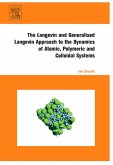Additional chapters cover Coupled cluster downfolding techniques: a review of existing applications in classical and quantum computing for chemical systems, Exploring the attosecond laser-driven electron dynamics in the hydrogen molecule with different real-time time-dependent configuration interaction approaches, Molecular systems in spatial confinement: variation of linear and nonlinear electrical response of molecules in the bond dissociation processes, and much more.
- Updates on the latest developments and performance of SAPT
- Presents key theory and applications of high precision calculations for few electron systems
- Includes discussions on the development and applications of the DFT approach
Dieser Download kann aus rechtlichen Gründen nur mit Rechnungsadresse in A, B, BG, CY, CZ, D, DK, EW, E, FIN, F, GR, HR, H, IRL, I, LT, L, LR, M, NL, PL, P, R, S, SLO, SK ausgeliefert werden.









